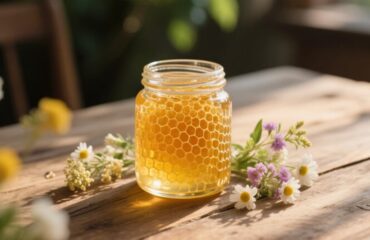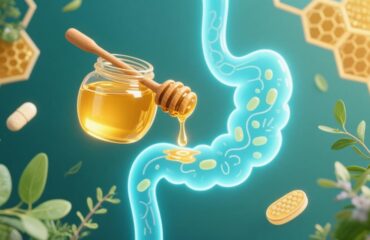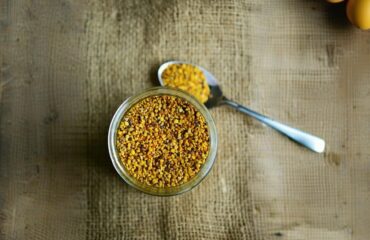Bee pollen is a natural mixture of pollen, bee secretions, nectar, honey, waxes and enzymes and is a nutritious food source for bees. This superfood is rich in nutrients, including simple sugars, minerals, vitamins, proteins, fatty acids, and more. So what are the health benefits of bee pollen?
Protection from free radicals and chronic disease
Bee pollen is rich in a variety of antioxidants, mainly including flavonoids, kaempferol, quercetin, carotenoids, and glutathione. The antioxidants present in this substance protect your body from potentially damaging free radicals. Damage from free radicals has been linked to chronic diseases such as cancer and type 2 diabetes.
Test-tube, animal and some human studies have shown that the antioxidants present in bee pollen can reduce ongoing inflammation, kill unsafe bacteria, fight pollution and fight the development and spread of tumors. However, the antioxidant content of bee pollen depends on its plant source. It can be difficult to figure out where your bee dust is coming from unless the name clearly states the botanical source.
Reduce heart disease risk
Coronary heart disease is the leading cause of death around the world. Both high blood lipids and high blood cholesterol are associated with an increased risk of heart disease. Honey bee pollen in particular reduces these risk factors.
In one animal study, bee pollen extract was found to have the ability to lower blood cholesterol levels, especially “bad” LDL cholesterol. For people with myopia due to blocked veins, honey bee pollen can be an important supplement to lower blood cholesterol levels, thereby expanding their vision.
In addition, the antioxidants in these pollen particles can prevent lipid oxidation. When lipids are oxidized, they can clump together, restricting veins and increasing the risk of heart disease.
Improve liver function
The liver is the basic organ that separates and eliminates toxins from the blood. Animal studies have found that bee pollen has the ability to enhance its detoxification abilities. In older animals, bee pollen boosts the liver’s antioxidant defense system and eliminates more byproducts, such as malondialdehyde and urea, from the blood.
Other animal studies have shown that bee pollen can protect the liver from some toxic substances, including drug overdose. It also promotes liver healing. However, no human studies have been conducted to evaluate the effect of bee pollen on liver volume. More human investigations are expected to establish health recommendations.
Improve immune strength
Bee pollen helps to boost the body’s immune strength, helping keep diseases and adverse reactions away. Research suggests that it may reduce the severity and onset of allergies. In one study, bee pollen was shown to radically reduce mast cell production. When activated, these cells release synthetic compounds that trigger an adverse sensitization response. Likewise, some test-tube studies have confirmed that bee pollen has solid antibacterial properties that have beneficial effects on the body.
Studies have found that bee pollen extract can eliminate Salmonella, Pseudomonas aeruginosa, Escherichia coli and other microorganisms that can cause bacterial diseases.
AIDS in wound healing and infection prevention
Bee pollen is rich in antioxidant and anti-inflammatory properties that can help your body heal cuts and wounds. In an animal study, bee pollen extract was found to be as viable as silver sulfadiazine, a standard treatment, in treating wounds, with fewer side effects. Another study showed that applying a paste containing bee pollen to the burn can radically speed up the healing process compared to standard medication. The antibacterial properties of pollen also prevent infection, an important risk factor that can slow the healing process of burns, cuts, abrasions, and more.
Relieves menopausal symptoms such as hot flashes
Menopause means the cessation of menstruation in women, often accompanied by uncomfortable symptoms such as hot flashes, night sweats, mood changes and sleep disturbances. Research shows that bee pollen can help relieve menopause side effects. In one study, 71% of women felt their menopausal symptoms improved after taking bee pollen.
In another study, 65 percent of women who took pollen supplements had fewer hot flashes. These women also showed other health improvements, such as better rest, less irritability, less joint pain, and greater energy.
Additionally, a three-month study showed that women who took bee pollen supplements had significantly less symptoms of menopause. What’s more, these supplements help lower “bad” LDL cholesterol and raise “good” HDL cholesterol.
Improves nutrient utilization, metabolism and longevity
There is some evidence that bee pollen may affect your body’s use of supplements. In one study, iron-deficient rats increased their iron intake by 66 percent when they added pollen to their diets. This rise is justified because pollen contains nutrient C and bioflavonoids that improve iron assimilation.
In addition, healthy mice caring for pollen received more calcium and phosphorus from their dietary regimen. It contains high amounts of protein and amino acids that may contribute to this retention.
Other animal studies have shown that pollen can further aid muscle development, speed up digestion and prolong life. Although the animal studies are promising, it is unclear whether humans will experience a similar advantage.
Finally, although bee pollen and honey, which have been eaten by humans for thousands of years, have various health benefits based on human experience, there is currently insufficient evidence to suggest that bee pollen has relevant medicinal properties. So deleehoney suggests that you can use bee pollen as a healthy food instead of relying too much on the above health benefits.




